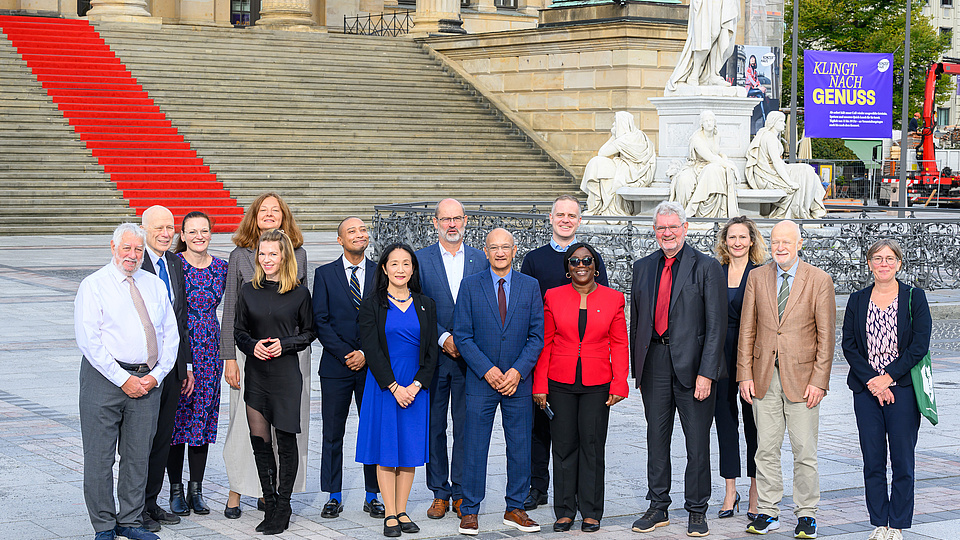Zum Inhalt springen
- {{#headlines}}
- {{title}} {{/headlines}}
E. William Colglazier
E. William Colglazier ist Chefredakteur von Science & Diplomacy und Senior Scholar am Center for Science Diplomacy der American Association for Advancement of Science. Er widmet sich bei seiner Arbeit der Förderung von Wissen und Verfahren im Bereich der Wissenschaftspolitik und -diplomatie zur Unterstützung der internationalen wissenschaftlichen Zusammenarbeit. Von 2016 bis 2018 war er Co-Vorsitzender der vom UN-Generalsekretär ernannten Gruppe für die Beratung in den Bereichen Wissenschaft, Technologie und Innovationen zur Erreichung der 17 Ziele für nachhaltige Entwicklung. Colglazier war drei Jahre lang als Berater für Wissenschaft und Technologie des US-Außenministers tätig. Als Vorstand der National Academy of Sciences und des National Research Council leitete er 17 Jahre lang Studien, die unabhängige, objektive wissenschaftliche Gutachten zu Fragen der öffentlichen Ordnung lieferten. Er promovierte am Caltech in Physik und arbeitete anschließend beim Stanford Linear Accelerator Center, am Institute for Advanced Study in Princeton, beim Center for Science and International Affairs an der Harvard Kennedy School of Government und an der Universität Tennessee. Zu seinen Auszeichnungen zählen der Joseph A. Burton Forum Award für „herausragende Beiträge zum öffentlichen Verständnis oder zur Lösung von Fragen rund um die Schnittstelle von Physik und Gesellschaft“ sowie der Order of the Rising Sun für seinen „Beitrag zum wissenschaftlichen und technologischen Austausch sowie zur gegenseitigen Verständigung zwischen Japan und den Vereinigten Staaten“.
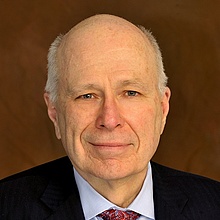
Schwerpunkte: Wissenschaftspolitik, Wissenschaftsdiplomatie, internationale wissenschaftliche und technologische Zusammenarbeit, Physik
Wolf B. Frommer
Wolf B. Frommer ist Alexander von Humboldt-Professor am Institut für Molekulare Physiologie und Mitglied beim CEPLAS an der Heinrich-Heine-Universität Düsseldorf. Darüber hinaus leitet er eine Gruppe am Institute for Transformative Biomolecules (ITbM) an der Universität Nagoya in Japan. Nach seiner Promotion an der Universität Köln wechselte er an die Freie Universität Berlin, wo er 1994 habilitierte. Bereits 1990 übernahm Frommer eine Gruppenleitung am Institut für Genbiologische Forschung in Berlin und war ab 1992 Juniorgruppenleiter, gefördert vom Ministerium für Wissenschaft und Technologie. 1996 wurde er ordentlicher Professor für Pflanzenphysiologie an der Universität Tübingen, und 1997 Gründungsdirektor des Zentrums für Molekularbiologie der Pflanzen (ZMBP). 2003 zog er nach Stanford, Kalifonien. Dort wurde er Direktor des Departments Plant Biology an der Carnegie Institution for Science und ordentlicher Professor an der Universität Stanford.
Er wurde unter anderem 1998 mit dem Gottfried Wilhelm Leibniz-Preis, 2001 mit dem Körber-Preis für die Europäische Wissenschaft und 2018 mit dem Tsungming Tu Award ausgezeichnet. Er wurde 2015 Mitglied der Leopoldina – der Deutschen Akademie der Wissenschaften und 2024 Mitglied der National Academy of Sciences USA.
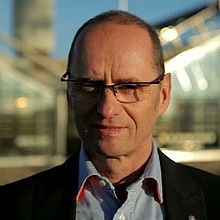
Schwerpunkte: Mechanismen des Zuckertransports, Entwicklung von Biosensoren, Interorgankommunikation, Ernteerträge, Mechanismen der Virulenz der Bakterien und Pflanzenabwehr, Genome Editing und neue Technologien
Graham Hutchings
Graham Hutchings ist Regius Professor für Chemie an der Universität Cardiff. Sein Chemiestudium absolvierte er am University College London. Zu Beginn seiner Karriere arbeitete er bei ICI und AECI Ltd, wo er sein Interesse für die Goldkatalyse entdeckte. 1984 wechselte er in den akademischen Bereich und hatte Lehrstühle an den Universitäten von Witwatersrand, Liverpool und Cardiff inne. 2009 wurde Graham Hutchings zum Fellow der Royal Society gewählt, 2010 zum Mitglied der Academia Europaea und zum Founding Fellow der Learned Society of Wales sowie 2023 zum Fellow der Royal Academy of Engineering und zum Honorary Fellow der Chinese Chemical Society. Er wurde 2013 mit der Davy Medal der Royal Society, 2017 mit dem ENI Award in der Kategorie Advanced Environmental Solutions, 2018 mit dem CBE und 2021 mit dem Michel Boudart Award ausgezeichnet. Er veröffentlichte über 950 Forschungsarbeiten.
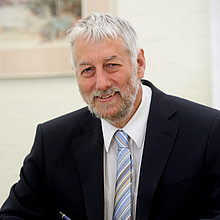
Schwerpunkte: Heterogene Katalyse, Goldkatalyse, Materialwissenschaft, Netto-Null-Politik
Duane Jethro
Duane Jethro ist Senior Lecturer in der Abteilung für Afrikastudien und Linguistik an der University of Cape Town. Er ist spezialisiert auf die Analyse der kulturellen Konstruktion von Erbe, umstrittener öffentlicher Kulturen und materieller Religion. Er war Postdoc-Stipendiat der Alexander von Humboldt-Stiftung und Vorsitzender des Auswahlausschusses des Bundeskanzler-Stipendienprogramms für angehende Führungskräfte aus Südafrika, das ebenfalls von der Alexander von Humboldt-Stiftung durchgeführt wird. Darüber hinaus ist er Herausgeber der Zeitschrift Material Religion und gehört dem Redaktionsausschuss von Museums and Social Issues an. Er ist Vorstandsmitglied der Association of Critical Heritage Studies und Herausgeber des Verbandsblogs Currents in Critical Heritage Studies. Sein Buch Heritage Formation and the Senses in Post-Apartheid South Africa: Aesthetics of Power ist bei Bloomsbury Academic erschienen.
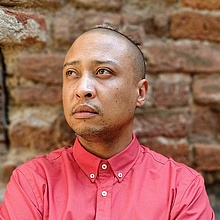
Schwerpunkte: cultural heritage, public culture, material religion, South Africa, Germany
Sabine Maasen
Sabine Maasen ist Professorin für Wissenschafts- und Innovationsforschung sowie Direktorin der TransferAgentur an der Universität Hamburg. Sabine Maasen promovierte und habilitierte im Fach Soziologie an der Universität Bielefeld. Sie arbeitete am Zentrum für interdisziplinäre Forschung (Bielefeld) und am Max-Planck-Institut für Psychologische Forschung (München), bevor sie 2001 einen Ruf auf die Professur für Wissenschaftsforschung/Wissenschaftssoziologie an der Universität Basel annahm. An der TU München hatte sie 2013 bis 2020 den Lehrstuhl für Wissenschaftssoziologie inne (Liesel Beckmann Distinguished Professorship) und war Direktorin des Munich Center for Technology in Society. Als ehemaliges Mitglied der Wissenschaftlichen Kommission des Wissenschaftsrats Deutschland sowie der Wissenschaftlichen Kommission Niedersachsens ist Sabine Maasen weiterhin für beide und viele weitere Gremien tätig.
Als (Wissenschafts-)Soziologin befasst sich Sabine Maasen mit dem Verhältnis von Wissenschaft und Gesellschaft, insbesondere dem Evidenzbezug gesellschaftlichen (so auch politischen, medialen und wirtschaftlichen) Handelns, mit der Demokratisierung von Wissenschaft und mit Dynamiken von Innovation und Legitimation. Es geht ihr zum einen um reflexive Forschung und Lehre, zum anderen um Prozesse und Formate der Mitgestaltung. Überdies betreibt Sabine Maasen Wissenschaftsforschung einerseits in Nähe zur Technikforschung (science and technology studies/STS) und andererseits zur Hochschulforschung.
Ihre Forschungsarbeiten richten sich erstens auf neue Formen der gesellschaftlich verantwortlichen Wissensproduktion (Inter-, Transdisziplinarität, Kokreation), zweitens auf den Zusammenhang von forcierter Innovationstätigkeit und gesellschaftlicher Legitimation von Forschung und Hochschule (neuer Gesellschaftsvertrag mit der Wissenschaft; Third Mission) und drittens auf wissenschafts- und technologiebezogene Aspekte der Selbst- und Fremdregulierung des Selbst (Neurogouverne¬mentalität, Soziale Robotik).
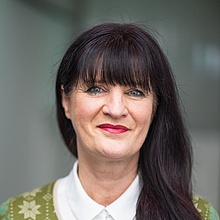
Schwerpunkte: Shaping & Reflecting on Science-Society Relations, Establishing and Profiling Third Mission at Universities, CoCreation In and Beyound Research
Elisabeth Malsch
Elisabeth Malsch ist Expertin für strukturelle Analysen und Entwürfe, mit Spezialisierung auf Untersuchungsprojekte. Sie ist versiert in statischen, dynamischen und nichtlinearen Analysen und der Bewertung von Gebäuden, temporären Strukturen und mechanischen Systemen unter den Auswirkungen typischer bis extremer Belastungen. Neben ihrer Tätigkeit im Vorstand von Thornton Tomasetti und als Co-Leiterin des Bereichs Forensik ist Malsch Mitglied des Führungsteams, das das Forschungs- und Entwicklungsprogramm des Unternehmens überwacht. Im Rahmen dieser Initiative war sie eine der führenden Entwicklerinnen von Hummingbird Kinetics, einem harmonischen Flüssigkeitsdämpfer für hohe und sehr hohe Gebäude, der auf NASA-Technologie basiert. Malsch hält u.a. Vorträge zu Themen, die von technischer Innovation bis zur Verbesserung der Vielfalt im Ingenieurwesen reichen.
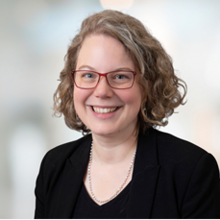
Schwerpunkte: technische Mechanik, Konstruktion und Untersuchung von Bauwerken, forensische Analyse.
Oluwatoyin Odeku
Prof. Dr. Oluwatoyin Odeku ist Professorin für Pharmazie und ehemalige Dekanin der Fakultät für Pharmazie der Universität Ibadan, Nigeria 2006 erhielt sie das Georg Forster-Forschungsstipendium an der Martin-Luther-Universität Halle-Wittenberg. Von 2011 bis 2014 kehrte sie für eine Institutspartnerschaft nach Bonn zurück und arbeitet derzeit mit Kolleg*innen an der Universität Potsdam zusammen. 2021 wurde sie mit dem Humboldt-Alumni-Preis für innovative Netzwerkinitiativen ausgezeichnet, in deren Rahmen sie ein strukturiertes Mentoring-Programm für Frauen in der Wissenschaft in Nigeria durchführt. Oluwatoyin Odeku ist Vertrauenswissenschaftlerin der Alexander von Humboldt-Stiftung in Nigeria. Außerdem ist sie Fellow der Nigerian Academy of Science und der Nigerian Academy of Pharmacy.
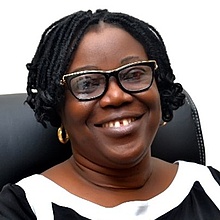
Schwerpunkte: Pharmazie
Faith Osier
Faith Osier ist Kinderärztin aus Kenia, spezialisierte sich in Liverpool auf Immunologie und promovierte an der Open University in Großbritannien. Sie ist Leiterin der Forschungsgruppe Malaria Immunology and Vaccinology an der Fakultät für Naturwissenschaften des Imperial College London, wo sie auch als Co-Direktorin des Institute of Infection fungiert. Zuvor leitete sie zwei internationale Forschungsteams in Kenia und Deutschland mit der Vision, Malaria durch Impfungen auszurotten. Ihre Arbeit konzentriert sich auf die Impfstoffentwicklung, das Identifizieren von Schutzkorrelaten und Mechanismen zur Förderung des Immunschutzes. Zudem möchte sie die nächste Generation afrikanischer Wissenschaftler inspirieren und dabei unterstützen, die Lösungen bereitzustellen, die der Kontinent dringend braucht. Osier hat für ihre Arbeit international Anerkennung gefunden und Auszeichnungen erhalten, darunter den Royal Society Pfizer Prize, den Sofja Kovalevskaja Award und einen African Research Leader Award der UKRI. Sie ist TED Fellow, EDCTP Senior Fellow, EMBO-Mitglied und #TOGETHERBAND-Botschafterin für das globale Ziel 3 der Vereinten Nationen. Osier ist ehemalige Präsidentin der International Union of Immunological Societies (IUIS) und wurde 2022 mit dem renommierten British Society for Immunology Lifetime Honorary Membership Award ausgezeichnet.
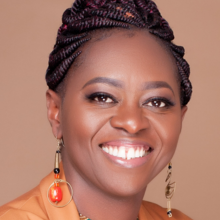
Schwerpunkte: Malaria, Immunität, Impfstoffe, afrikanische Wissenschaftler, Kapazitätsaufbau
Daya Reddy (Vorsitzender)
Daya Reddy ist emeritierter Professor für angewandte Mathematik an der Universität Kapstadt (UCT) und hatte dort zuvor den südafrikanischen Forschungslehrstuhl für numerische Mechanik inne. Bis Juli 2024 fungierte er als vorläufiger Vizekanzler (entspricht der Position des Präsidenten) der Universität Kapstadt. Nach seinem Grundstudium im Bauingenieurwesen an der UCT, einer Promotion an der Universität Cambridge und einem Jahr als Postdoktorand am University College London kehrte er für eine akademische Anstellung an die UCT zurück und war später sieben Jahre lang Dekan der wissenschaftlichen Fakultät. Die Forschungsschwerpunkte von Professor Reddy liegen in den Bereichen mathematische Modellierung, Analysen und Berechnungen in der soliden Mechanik, mit Anwendungen in der Materialwissenschaft und der biomedizinischen Mechanik. Er war Präsident der Akademie der Wissenschaften Südafrikas sowie im Zeitraum von 2018 bis 2021 der erste Präsident des International Science Council (ISC). Reddy erhielt den Research Distinction Award der South African Mathematical Society und den nationalen Order of Mapungubwe. Er ist Fellow der International Association for Computational Mechanics und wurde von der Alexander von Humboldt-Stiftung mit dem Georg Forster-Forschungspreis ausgezeichnet.
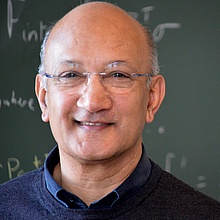
Schwerpunkte: Hochschulbildung und Forschung, Wissenschaft für Gesellschaft und Politik, Politik für die Wissenschaft, wissenschaftliche Zusammenarbeit
Robert Schlögl
Der Chemiker Robert Schlögl ist seit Januar 2023 neuer Präsident der Alexander von Humboldt-Stiftung. Nach Studium und Promotion in München arbeitete Robert Schlögl zunächst als Postdoc in Cambridge und dann in Basel, bevor er sich in Berlin habilitierte. 1989 trat er eine Professur an der Goethe-Universität in Frankfurt am Main an, fünf Jahre später wurde er zum Direktor am Fritz-Haber-Institut der Max-Planck-Gesellschaft, Berlin, berufen. Bis 2022 war er Gründungs- bzw. geschäftsführender Direktor am Max-Planck-Institut für Chemische Energiekonversion in Mülheim an der Ruhr und bis 31. März 2023 Direktor am Fritz-Haber-Institut in Berlin.
Er ist ein international renommierter und vernetzter Wissenschaftler mit dem Forschungsschwerpunkt Energieumwandlungsprozesse und Katalysatoren. Mit seinen Arbeiten hat er zu einem neuen Verständnis katalytisch aktiver Materialien beigetragen. Als Experte für Energiesysteme der Zukunft und die komplexen Herausforderungen der Energiewende ist er auch in der Politikberatung und Wissenschaftskommunikation sehr erfahren und gefragt.
Neben seiner Forschung ist Robert Schlögl national wie international in zahlreichen Gremien und Beiräten aktiv. Er ist Vizepräsident der Nationalen Akademie der Wissenschaften Leopoldina und Mitglied mehrerer anderer Akademien, so auch Fellow der Royal Society of Chemistry in London.
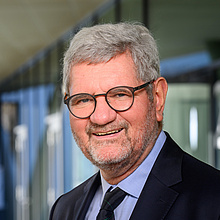
Schwerpunkte: Energieumwandlungsprozesse, Katalysatoren, nachhaltige Energiesysteme
Tatiana Shchyttsova
Tatiana Shchyttsova ist Professorin an der Fakultät für Sozialwissenschaften der Europäischen Humanistischen Universität in Vilnius. Bei der EHU handelt es sich um eine belarussische Exiluniversität, die 2004 in Minsk von den Behörden geschlossen wurde. Tatiana Shchyttsova studierte Philosophie und promovierte an der Belarussischen Staatlichen Universität. 2008 habilitierte sie sich an der Russischen Staatlichen Geisteswissenschaftlichen Universität in Moskau. Über 20 Jahre lang leitete sie das Zentrum für Philosophische Anthropologie an der EHU. Dieses wurde 2020 umbenannt, um den transdisziplinären Ansatz zu unterstreichen, und heißt nun Zentrum für die Erforschung von Intersubjektivität und interpersoneller Kommunikation. Sie ist die Gründerin und Chefredakteurin der Zeitschrift für Philosophie und Kulturwissenschaften Topos (erscheint seit 2000). Tatiana Shchyttsova erhielt zahlreiche internationale Forschungsstipendien, darunter das Stipendium der Alexander-von-Humboldt-Stiftung, und hielt eine Reihe von Gastvorträgen an verschiedenen europäischen akademischen Einrichtungen (u. a. am Institut für die Wissenschaften vom Menschen in Wien, an der Universität Freiburg und an der Universität Helsinki). Von 2009 bis 2011 leitete sie das Forschungsdezernat an der EHU. 2009 wurde Tatiana Shchyttsova vom American Council of Learned Societies mit dem Solomiya Pavlichko Prize für ihren Beitrag zur Entwicklung des ACLS Humanities Program in Belarus, Russland und der Ukraine ausgezeichnet. Von 2018 bis 2022 war sie Präsidentin der International Association for the Humanities (MAG). Sie gehört seit vielen Jahren der Expertenkommission beim jährlichen Publikationswettbewerb für Wissenschaftler*innen aus Belarus an. Im Oktober 2021 wurde Tatiana Shchyttsova zur Beraterin für Bildung und Wissenschaft der gewählten Präsidentin von Belarus Swjatlana Zichanouskaja ernannt.
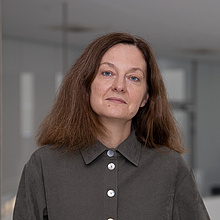
Schwerpunkte: Philosophie
Kanako Takayama
Die Rechtswissenschaftlerin Kanako Takayama ist eine der angesehensten Rechtsexperten Japans. Sie gilt als Pionierin in der Forschung im Bereich des internationalen und europäischen Strafrechts.
Takayama hat seit 2005 eine ordentliche Professur an der juristischen Fakultät der Universität Kyoto in Japan inne. Nach ihrem Jurastudium an der Universität Tokio startete sie dort 1993 als wissenschaftliche Assistentin ihre berufliche Laufbahn. 1996 wurde sie dann Dozentin an der juristischen Fakultät der Seijo-Universität. Anschließend erhielt sie ein Humboldt-Forschungsstipendiat, das sie zur Universität Köln brachte, wo sie von 1998 bis 2000 als Gastwissenschaftlerin tätig war. Daraufhin arbeitete sie als außerordentliche Professorin an der juristischen Fakultät der Seijo-Universität, bevor sie 2002 an die Universität Kyoto wechselte.
Neben ihren Forschungsarbeiten engagiert sich Takayama auch im sozialen Bereich. Sie unterstützt Frauenrechte und hat in Japan wiederholt öffentlich Stellung zu aktuellen Themen bezogen, beispielsweise in ihrer Funktion als Expertin im Zusammenhang mit der Ausarbeitung von Richtlinien für die Stammzellforschung oder Regulierungen der Unternehmenstätigkeit.
2006 wurde Takayama das Bundesverdienstkreuz der Bundesrepublik Deutschland verliehen. 2017 wurde sie als bisher jüngste Wissenschaftlerin im Bereich der Geistes- und Sozialwissenschaften in den japanischen Wissenschaftsrat, den Science Council of Japan, berufen. Zudem ist sie als erste Frau im Vorstand der japanischen Strafrechtslehrervereinigung, der Criminal Law Society of Japan.
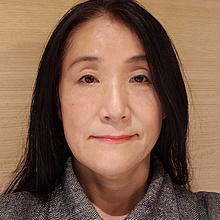
Schwerpunkte: Wirtschaftsstrafrecht & Nachhaltbarkeit des Rechtssystems
Johannes Vogel
Johannes Vogel ist Generaldirektor am Museum für Naturkunde, Leibniz-Institut für Evolutions- und Biodiversitätsforschung und Professor für Biodiversität und Wissenschaftsdialog an der Humboldt-Universität zu Berlin. Er promovierte in Genetik an der University of Cambridge, arbeitete anschließend am Natural History Museum in London bevor er 2012 seine Berliner Stellen antrat.
Er ist Präsident der European Citizen Science Association, Trustee der Falling Walls Foundation und beriet die Europäische Kommission (Vorsitz & Mitglied Open Science Policy Platform) und mehrere deutsche Regierungen (z.B. Bioökonomie Council, Hightech Forum, wissenschaftlicher Co-Vorsitzender des Wissenschaftsjahres 2022 „Nachgefragt“). Seine Interessen sind Demokratie und Innovation, die Rolle von Museen in Wissenschaft und Gesellschaft, öffentliches Engagement für Wissenschaft, offene Wissenschaft, Wissenschaftspolitik und Natur. Für seine Beiträge zu Wissenschaft und Gesellschaft wurde er mit dem Verdienstkreuz am Bande des Verdienstordens der Bundesrepublik Deutschland und dem Verdienstorden des Landes Berlin ausgezeichnet. Im Jahr 2010 wurde er zum Fellow der AAAS gewählt und er ist Träger des Straßburger Preises 1996.
Mit einer naturkundlichen Sammlung von über 30 Millionen Objekten und rund 150 wissenschaftlichen Mitarbeitern ist das Museum eines der größten Forschungsmuseen der Welt. Die Vision des Museums ist es, den wissenschaftlichen und gesellschaftlichen Dialog zu fördern, um den Einsatz für Natur und Demokratie zu unterstützen. Etwa 60 % der über 800 000 jährlichen Besucher sind junge Erwachsene.

Schwerpunkte: Biodiversität und Wissenschaftsdialog
